The Rising Importance of Banking Software Development
Banks around the world are significantly increasing their investment in digital technologies to keep pace with changing customer demands. Over 80% of global banks are now prioritizing digital transformation, pushing the advancement of banking software solutions companies. In fact, the global core banking software market was valued at approximately $12.4 billion in 2025 and is projected to reach $21.6 billion by 2030, expanding at a compound annual growth rate of about 10%. Even more compelling, the broader digital banking platform market is expected to surge around $107 billion by 2030, marking a rapid annual growth rate of nearly 20%. To meet this demand, banks are increasingly partnering with experienced banking software developers who understand regulatory requirements, security standards, and modern customer expectations.
Banking software companies has shifted from being an optional investment to a core part of how financial institutions operate today. Customers now expect quick, secure, and intuitive interactions with their banks, leaving older manual processes behind. Emerging technologies like artificial intelligence (AI), blockchain, and cloud computing are changing how banks work. They improve operations, reduce risks, and enable more personalized customer experiences. In this context, strategic banking software development helps institutions build long-term digital capabilities instead of relying on fragmented point solutions.
In this guide, we’ll introduce you to some of the top banking software companies and finance software development companies leading innovation in fintech. This list will help you select the right partner to upgrade your banking infrastructure or develop modern financial platforms. It also provides a high-level overview of the global banking & financial software development landscape so you can better understand which models and engagement formats suit your business needs.
Top-10 Banking Software Companies in 2026 – Best Core Banking Platforms & Providers
1. Itexus: Pioneering the Future of Banking Software
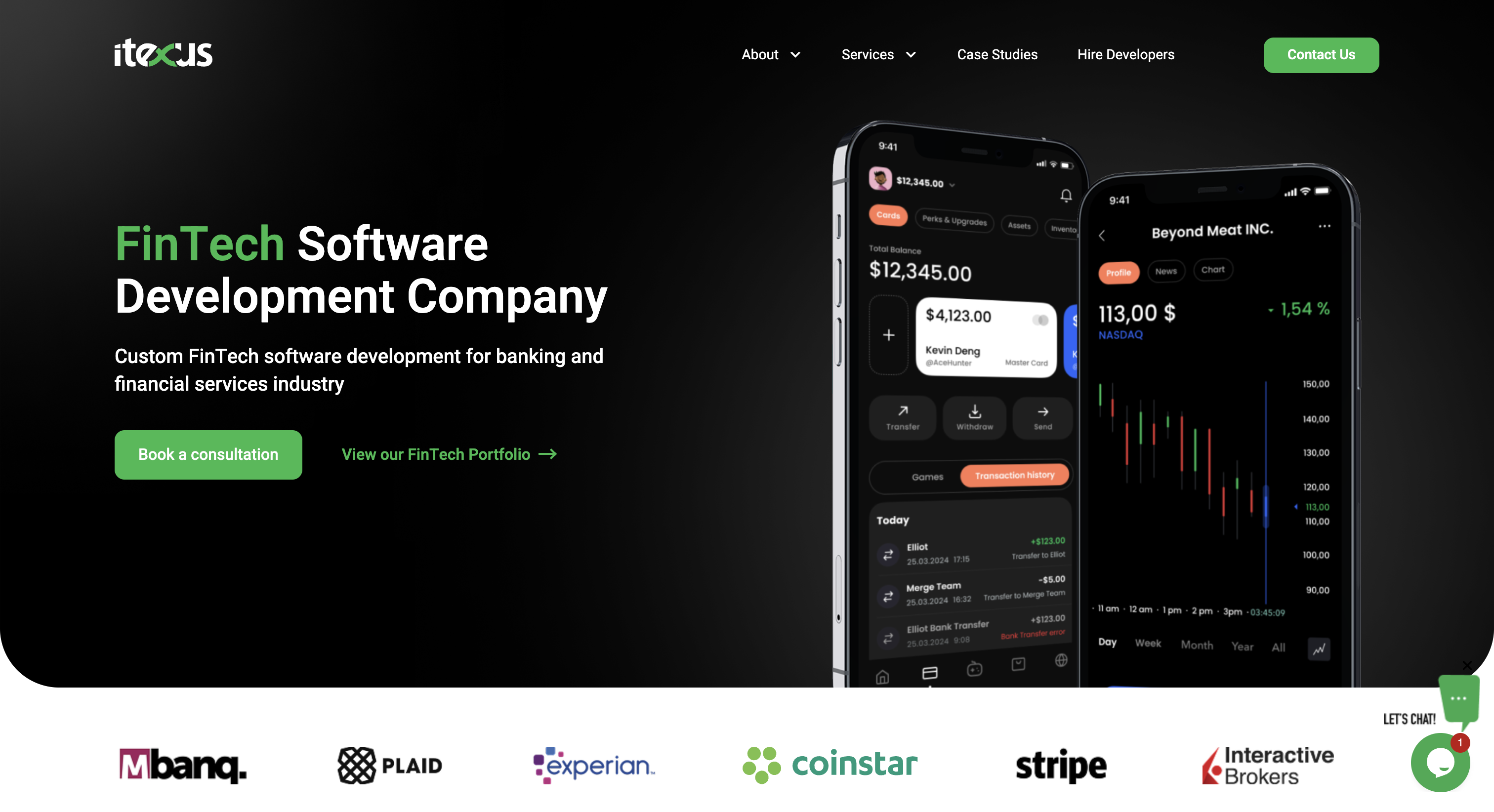
Founded: 2013
Employees: 50–200
Hourly Rate: $50-$99
Location: USA
Itexus stands out as a top-tier banking software development company, offering bespoke solutions designed to meet the unique needs of financial institutions. With expertise in modernizing legacy banking systems, Itexus helps clients transform outdated infrastructures into agile, scalable, and efficient platforms. The company is renowned for its ability to automate critical banking processes, improving operational efficiency while minimizing human error. Itexus is also at the forefront of integrating cutting-edge technologies, ensuring that financial businesses remain competitive and future-ready.
Services:
- Custom banking software development
- Fintech solutions
- Mobile banking apps
- Digital wallets and payment gateways
Key Projects:
- Developed a comprehensive platform for a US-based financial startup, supporting their full-scale digital transformation.
Pros and Cons:
- Pros: Custom solutions, deep fintech expertise, strong focus on security.
- Cons: Medium-sized team, which may limit capacity for extremely large-scale projects.
2. Appinventiv: Transforming Banking Software Development Through Next-Gen Digital Innovation
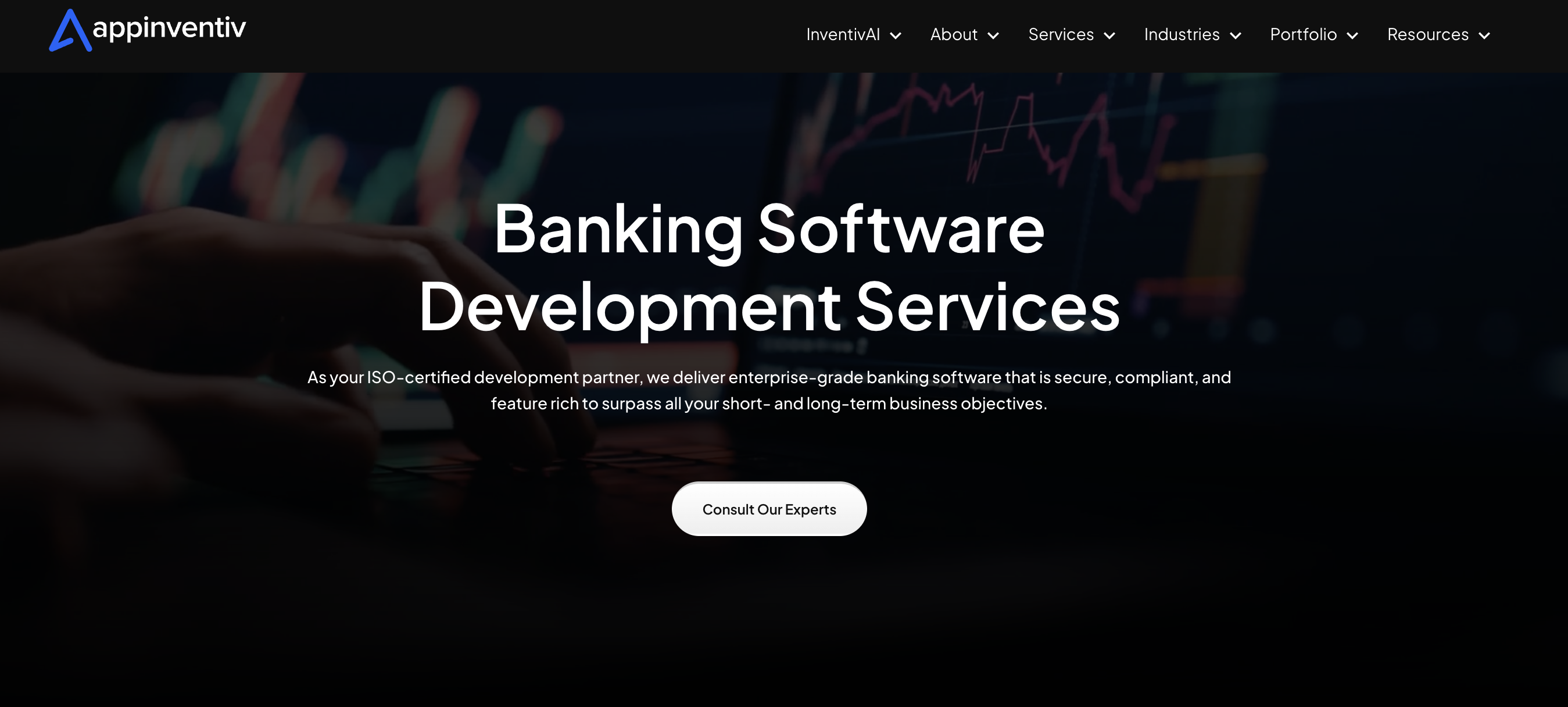
Founded: 2015
Employees: 1,000+
Hourly Rate: $25–$49
Location: USA
Appinventiv is a leading banking software development company known for delivering secure, scalable, and innovation-driven digital solutions for financial institutions across the globe. With a strong reputation in building mobile-first and cloud-native banking products, Appinventiv helps banks streamline operations, enhance customer experience, and accelerate digital transformation. The company excels in modernizing legacy banking systems, developing high-performing fintech applications, and implementing advanced technologies such as AI, blockchain, and automation to power next-gen banking experiences.
Services:
- Core banking software modernization
- Mobile & digital banking app development
- Digital payments & wallet solutions
- AI-driven risk assessment & fraud prevention
- Blockchain-based financial solutions
- Compliance-driven fintech software development
Key Projects:
- Built a feature-rich banking platform for a Middle Eastern financial enterprise, enabling secure onboarding, KYC automation, and real-time transaction monitoring.
- Developed a digital payments ecosystem for a leading fintech startup, supporting multi-currency transactions and robust compliance workflows.
Pros: Large and experienced engineering team, strong fintech domain expertise, extensive portfolio across global banks, competitive pricing.
Cons: High demand for services may occasionally extend onboarding timelines for new projects.
3. Innowise: Compliant and Innovative Banking Solutions
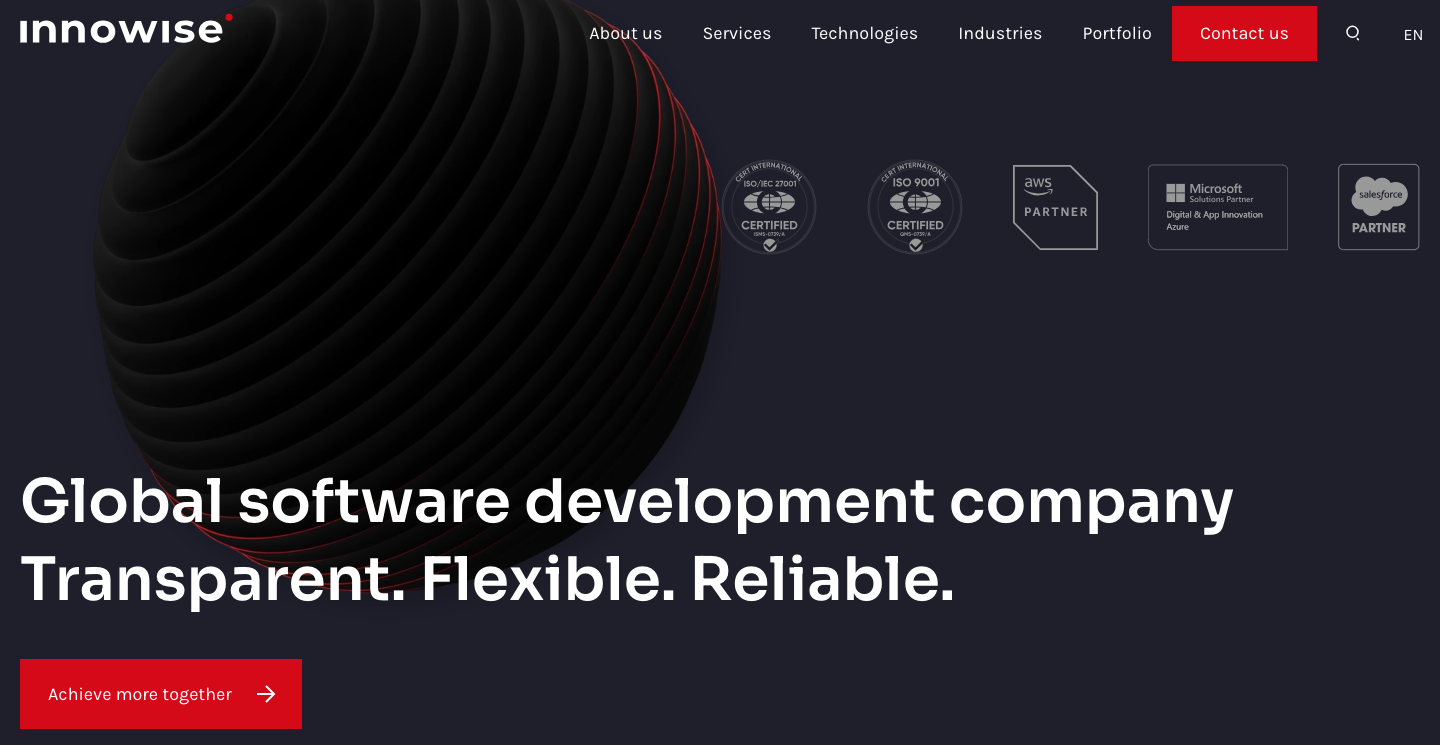
Founded: 2007
Employees: 2500+
Hourly Rate: $50-$99
Location: Europe
Innowise is a global software development company recognized for delivering tailored banking software solutions that drive digital transformation in the financial sector. With a strong focus on innovation and compliance, Innowise empowers banks and fintech companies to streamline operations, enhance customer experience, and meet stringent regulatory standards. The company is highly experienced in developing scalable, secure, and future-proof systems that enable clients to stay ahead in a rapidly evolving digital landscape.
Services:
- Core banking software development
- Fintech and insurtech solutions
- Payment systems and digital wallets
- RegTech and compliance automation
Key Projects:
- Developed an integrated RPA solution for an American bank to automate the execution of SOX-relevant controls, streamline data extraction, and integrate seamlessly with its existing applications.
Pros and Cons:
- Pros: Broad fintech portfolio, strong compliance knowledge, scalable architecture expertise.
Cons: Mid-sized company; may not offer niche consulting services compared to boutique firms.
4. SDK.finance: Streamlining Payments and Core Banking
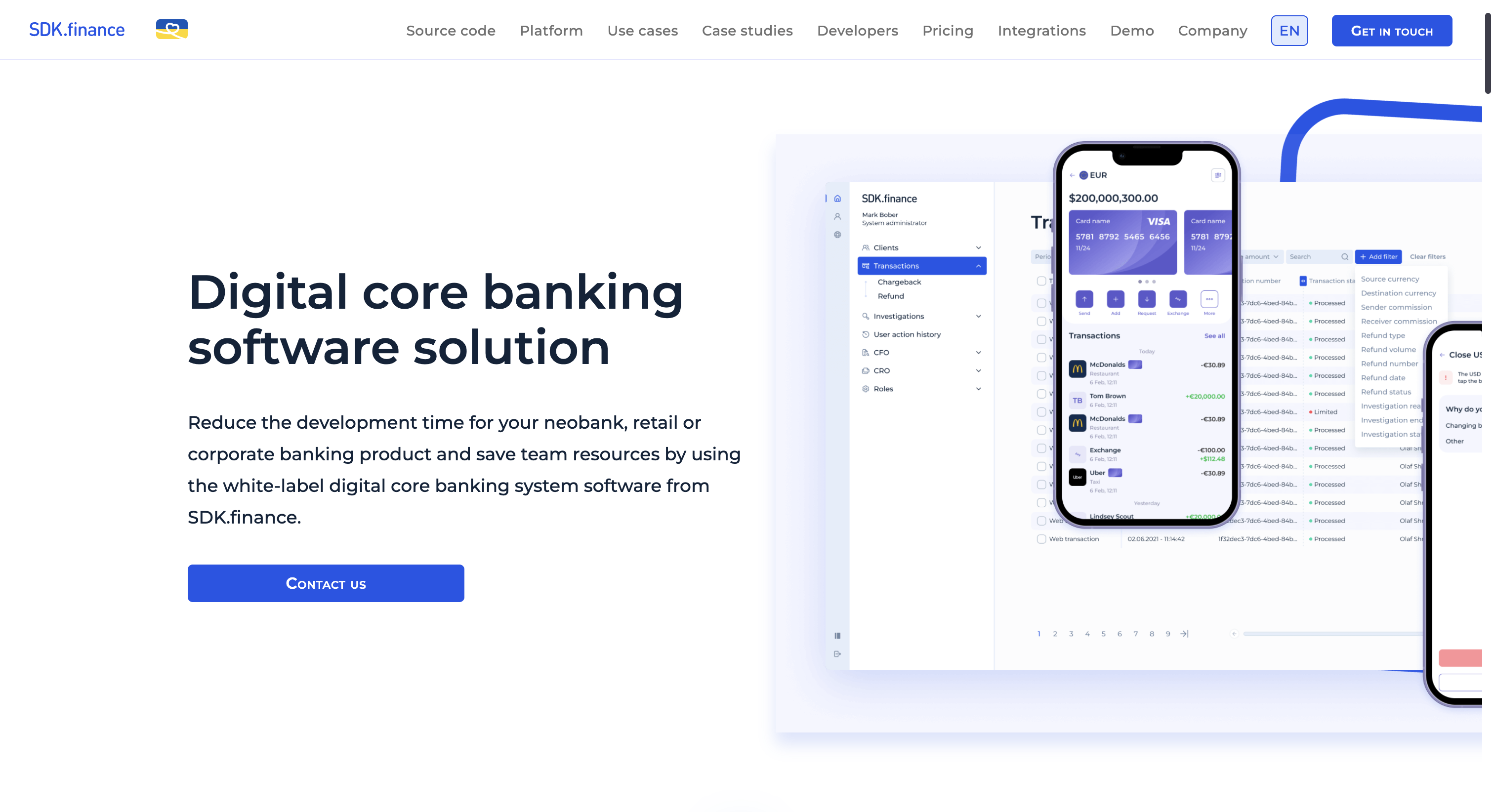
Founded: 2013
Employees: 50–200
Hourly Rate: $25-$49
Location: Europe
SDK.finance specializes in innovative fintech and banking software development, with a focus on creating flexible, high-performance financial platforms. Their SDK toolkit allows businesses to build their own financial services quickly and efficiently. With a robust API infrastructure, SDK.finance is a preferred partner for companies looking to streamline core banking processes or accelerate in-house banking software development without starting from scratch.
Services:
- Core banking solutions
- Fintech app development
- P2P payment applications
Key Projects:
- Developed a scalable payment processing system for a major European bank.
Pros and Cons:
- Pros: Affordable solutions, excellent API flexibility, fast implementation.
- Cons: Limited global presence outside Europe.
5. Mambu: Cloud-Native Core Banking Platform
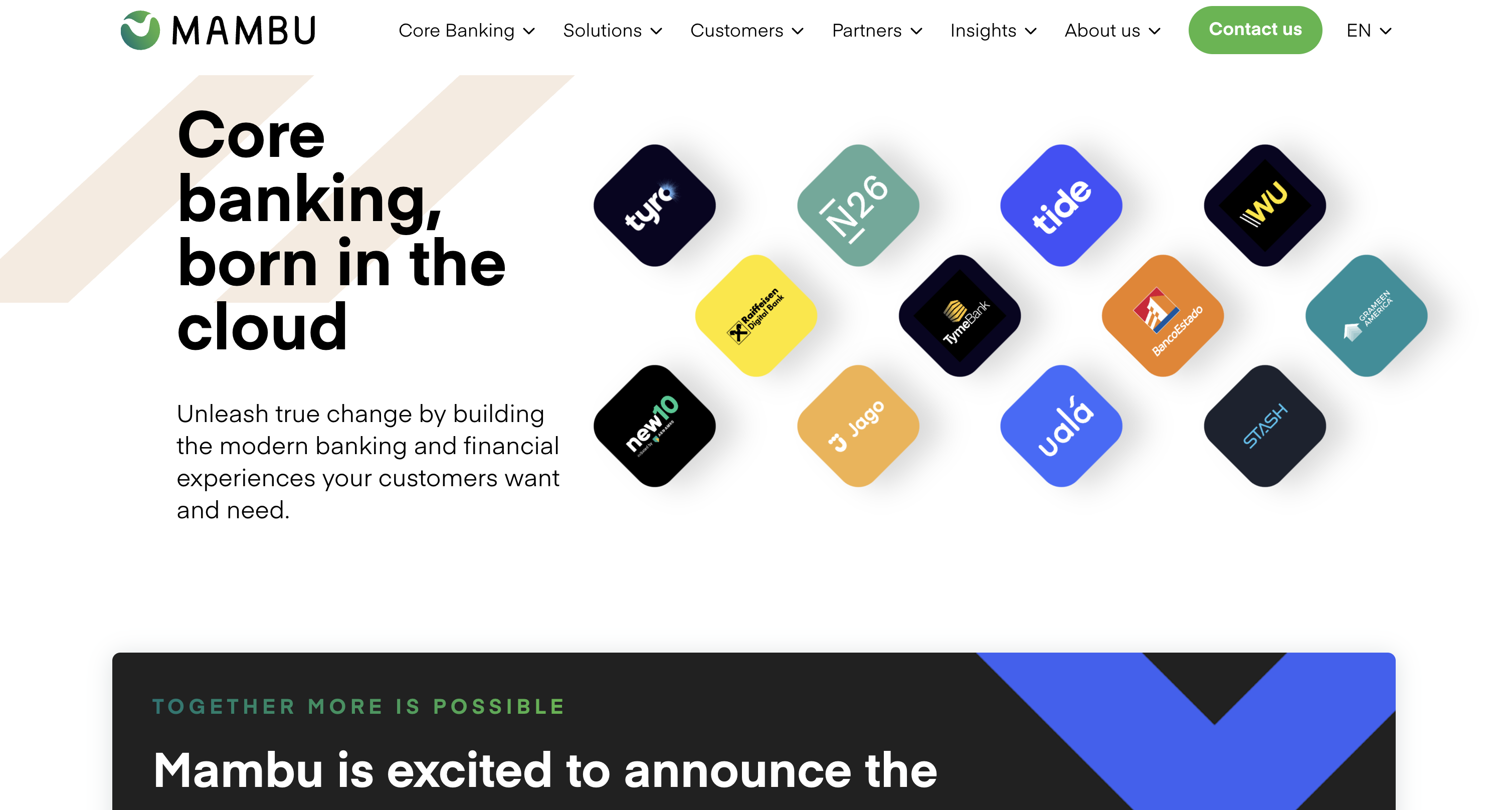
Founded: 2011
Employees: 500–1000
Hourly Rate: $50-$99
Location: Germany
Mambu offers a highly flexible, cloud-native core banking platform that supports financial institutions in adapting quickly to the evolving fintech landscape. Their platform powers challenger banks, fintech startups, and other financial services providers with agile solutions for loan management, lending, and more.
Services:
- SaaS banking platform
- Banking-as-a-Service (BaaS)
- Personal and business lending solutions
Key Projects:
- Assisted in the digital transformation of several challenger banks and fintech companies.
Pros and Cons:
- Pros: Highly flexible, scalable SaaS model, quick deployment.
- Cons: Newer entrant with fewer industry certifications.
6. Forbis: Innovating with AI and Cybersecurity Solutions
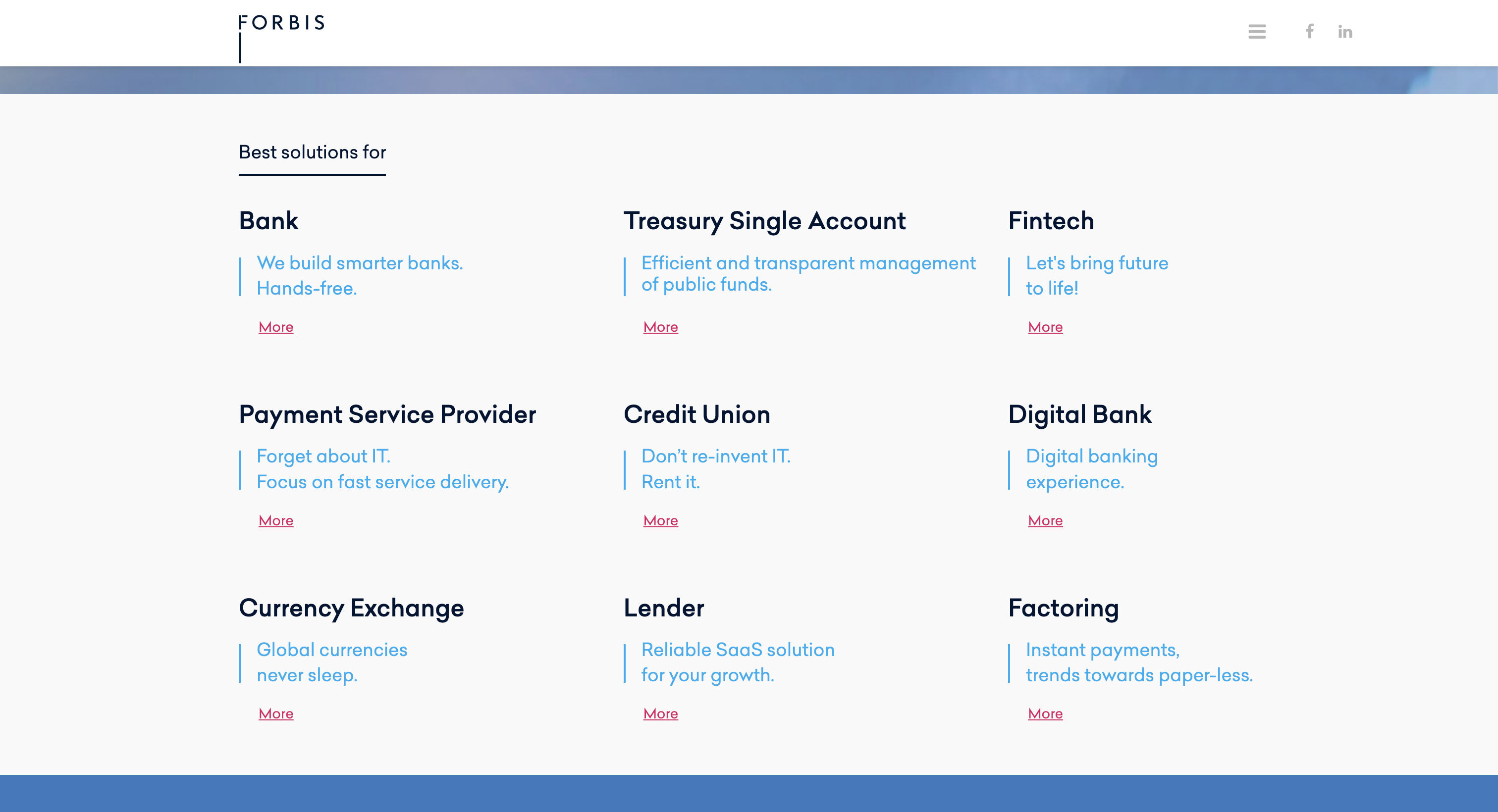
Founded: 1990s
Employees: 200–500
Hourly Rate: $50-$99
Location: Europe
Forbis has extensive experience in providing IT consulting and services, specializing in banking software, digital transformation, and cybersecurity. Their AI-driven solutions help financial institutions secure and streamline operations, ensuring that banks remain competitive in an ever-changing market.
Services:
- Fintech development
- Currency exchange platforms
- Payment services provider solutions
Key Projects:
- Developed a core banking system for a major Eastern European bank.
Pros and Cons:
- Pros: Extensive experience in fintech, customized solutions.
- Cons: Limited focus on emerging fintech trends.
7. Airwallex: Global Payments and Financial Platform
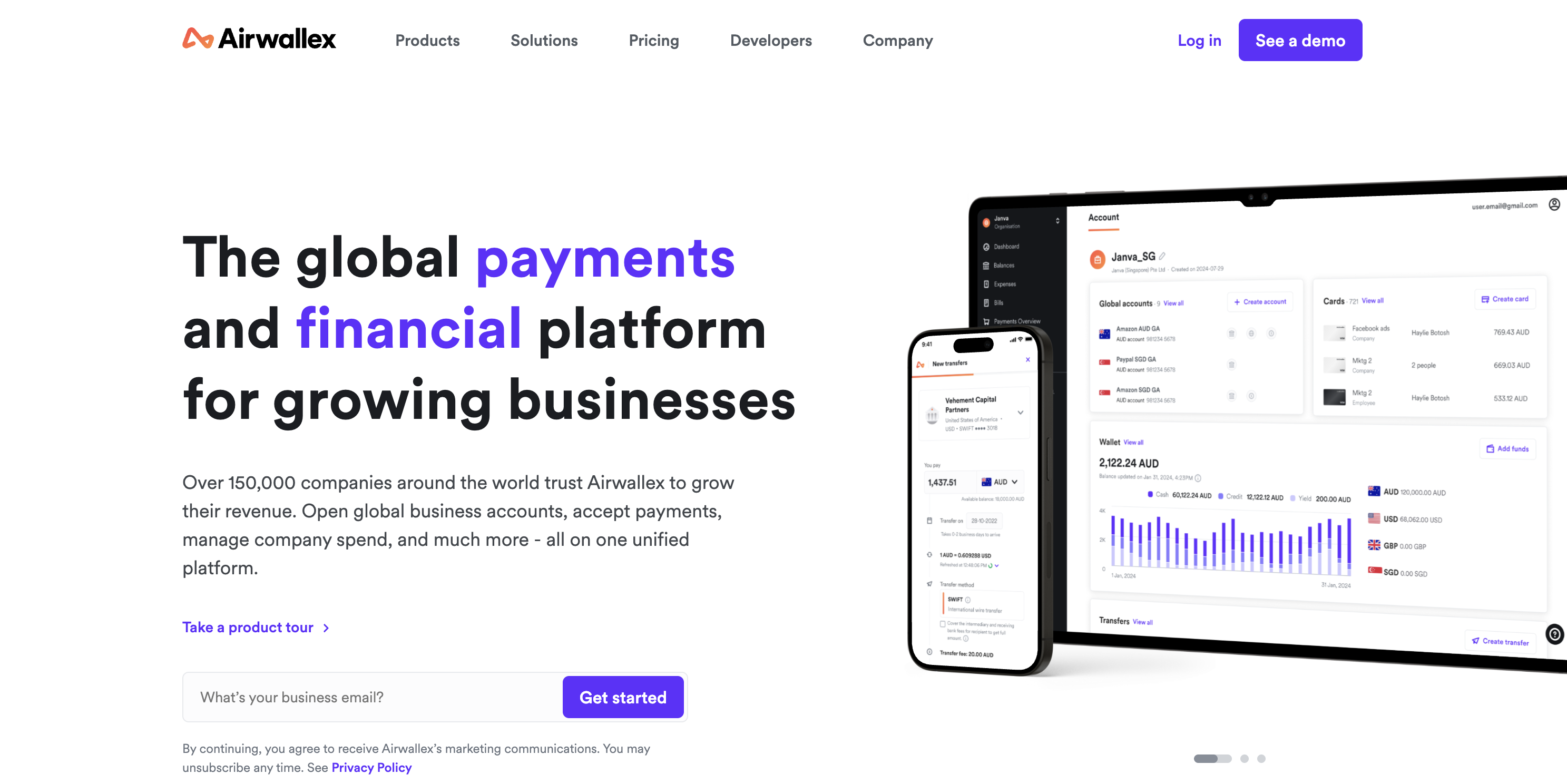
Founded: 2015
Employees: 500–1000
Hourly Rate: $50-$99
Location: Australia
Airwallex simplifies global payments for businesses. Their platform offers seamless cross-border transactions, making it easier for companies to manage international payments and financial operations. Airwallex’s focus on innovation is evident in its integration of BaaS and expense management tools.
Services:
- Expense management tools
- Banking-as-a-Service (BaaS)
- Cross-border payment solutions
Key Projects:
- Developed a seamless payment solution for e-commerce platforms and SMEs.
Pros and Cons:
- Pros: Innovative solutions for global payments, strong cross-border focus.
- Cons: Relatively new company, expanding global presence.
8. Stripe: A Comprehensive Payment Platform

Founded: 2010
Employees: 2000+
Hourly Rate: $100-$149
Location: USA
Stripe is a global leader in online payment processing solutions, offering a full suite of tools for handling subscriptions, billing, fraud prevention, and more. Known for its reliability, Stripe simplifies payment systems, making them more accessible and scalable for businesses of all sizes.
Services:
- Payment processing solutions
- Subscription management
- Fraud prevention tools
Key Projects:
- Streamlined payment systems for both startups and large enterprises.
Pros and Cons:
- Pros: Strong API, highly scalable solutions.
- Cons: Premium features can be costly for smaller businesses.
9. Finastra: Comprehensive Software Solutions for Financial Institutions

Founded: 2017
Employees: 10,000+
Hourly Rate: $100-$149
Location: UK
Finastra delivers market-leading solutions for lending, payments, and treasury management. Their software serves over 8,000 institutions globally, making them a key player in the financial technology space. Finastra’s comprehensive solutions help institutions streamline their operations and enhance their digital offerings.
Services:
- Investment management
- Corporate banking solutions
- Payment processing
Key Projects:
- Developed an end-to-end platform for a leading global bank.
Pros and Cons:
- Pros: Extensive product range, proven track record with large institutions.
- Cons: Complex integration process and higher implementation costs.
10. Fiserv: Pioneering FinTech Innovation
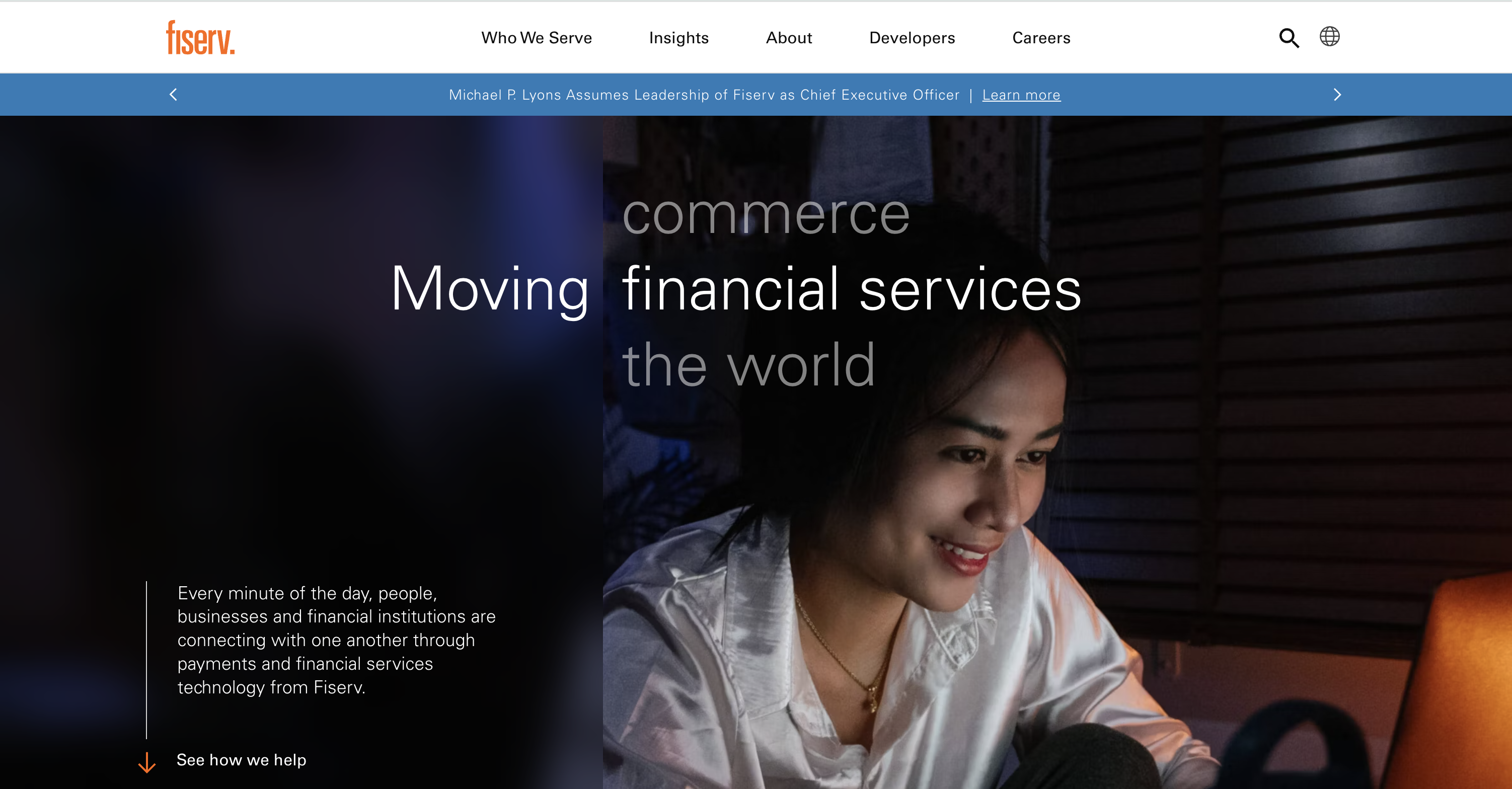
Founded: 1984
Employees: 20,000+
Hourly Rate: $100-$149
Location: USA
Fiserv has been a leader in financial technology for decades, offering solutions that range from core banking systems to payment processing and risk management. Their innovative offerings enable institutions to undergo digital transformation, reducing costs and improving operational efficiency.
Services:
- Core banking systems
- Payment processing solutions
- Risk management services
Key Projects:
- Modernized payment infrastructure for several large financial institutions.
Pros and Cons:
- Pros: Extensive experience, comprehensive range of services.
- Cons: High cost and complexity due to their size.
Key Trends Shaping Banking Software Development
- Artificial Intelligence (AI): AI technologies like machine learning are revolutionizing customer service. Automated chatbots, for instance, provide round-the-clock support, while AI helps detect and prevent fraud by identifying unusual transaction patterns.
- Blockchain: Blockchain technology ensures secure, transparent transactions by creating immutable digital ledgers. This is particularly valuable in areas like cross-border payments, where trust and transparency are crucial.
- Cloud Technologies: Cloud platforms offer scalable, cost-efficient infrastructure for financial needs. From data storage to real-time customer interactions, cloud solutions enable financial institutions to deliver a flexible, modern experience.
- Open Banking: Open banking allows third-party developers to build applications around a bank’s ecosystem, enabling better-tailored services and promoting innovation in the fintech sector.
The Role of FinTech Ecosystems in Banking Software Development
Modern banking software companies don’t operate in isolation. It thrives within a broader fintech ecosystem that includes banks, startups, and technology providers interested to search similar companies for collaboration. Many of these partners are global finance software development companies that bring niche domain knowledge, reusable components, and accelerators to the table. By integrating advanced technologies like AI and blockchain, financial institutions can deliver faster, more secure transactions, ultimately enhancing customer experiences.
Furthermore, the collaboration between banks and fintech startups fosters innovation, allowing financial institutions to adopt new technologies and stay competitive. These ecosystems ensure that banking software solutions companies are continually evolving, providing customers with more value and ensuring institutions remain adaptable to shifting market demands. As ecosystems mature, working with the right technology partners becomes a key differentiator for institutions that want to innovate quickly without compromising compliance or security. In many cases, this means combining internal teams with external banking software developers who bring fresh perspectives and specialized technical skills.
The Future of Banking Software
The future of banking software development is bright, with several key innovations expected to shape the industry:
- Advanced AI and Predictive Analytics: AI will continue to transform customer experiences, enabling smarter decision-making and personalized services.
- Blockchain Expansion: Blockchain’s role will expand beyond cryptocurrency, enhancing security and transparency in various financial transactions.
- Cloud Adoption: Cloud technologies will continue to offer scalable, cost-effective solutions for financial institutions, promoting greater flexibility and growth.
- Open Banking: Open banking will drive further innovation, enabling a wider range of tailored financial products and services.
As these trends evolve, demand will grow for finance software development companies and skilled banking software solutions companies that can combine strong engineering capabilities with deep industry expertise and an understanding of local regulations.
Conclusion: Choosing the Right Banking Software Development Company
Selecting the right banking software companies is crucial for ensuring the long-term success of your financial institution. Whether you’re looking to modernize existing systems or implement the best technologies, it’s important to partner with a provider that understands the evolving demands of the fintech landscape and has a proven track record in banking software development.
Each company listed here brings unique strengths to the table, from comprehensive fintech expertise to advanced security solutions. By aligning with a forward-thinking partner like Itexus, you can build secure, scalable, and innovative banking platforms that position your business for success in the digital age.
FAQ
1. What is banking software development?
Banking software development focuses on creating software solutions to streamline and enhance the operations of financial institutions, including customer management, transactions, and reporting.
2. Which software is commonly used in banking?
Common banking software includes core banking systems, digital wallets, payment processing platforms, and fraud detection solutions.
3. What programming languages are best for banking software?
Popular languages for banking software development include Java, Python, and C++ due to their reliability, security features, and performance.
4. How should I choose the right banking software development company?
Look for companies with extensive fintech experience, a strong track record, and the ability to provide custom solutions that meet your institution’s unique needs.